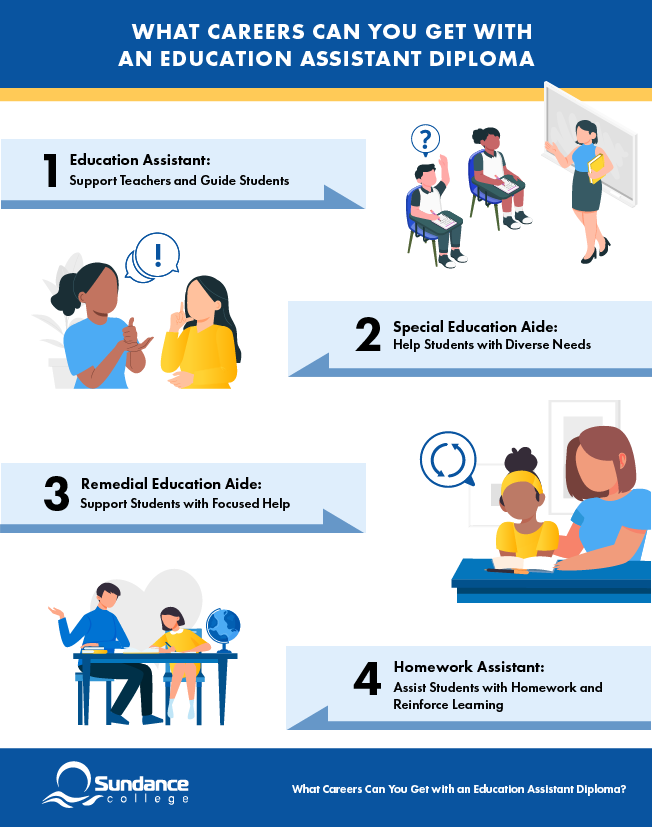Blog / What Careers Can You Get with an Education Assistant Diploma?
What Careers Can You Get with an Education Assistant Diploma?

Education Assistant Diploma
- Education Assistant
- Educational Resources Assistant
- Homework Assistant
- Remedial Education Aide
Table of Contents
“How I miss my school days…”
It’s something we’ve all heard, maybe even said ourselves. For many, school wasn’t only about lessons and grades. It was about the people who helped make each day easier and memorable, offering support when it was needed most.
With an education assistant diploma, you can become one of those important figures, contributing to students’ experiences in more ways than you know. You might work as an education assistant, supporting teachers and students in the classroom, or as a special education aide, helping students with unique learning needs. You could even be involved in remedial education, offering guidance to students who need additional support, or as a homework assistant, providing extra academic help often after-school.
Let’s explore the different education assistant careers this diploma can lead you to in detail.
Listen To: “What Careers Can You Get with an EDA Diploma – Which Career Suits You Best”
Education Assistant: Support Teachers and Guide Students
Education assistants, or EAs, are essential in today’s schools, especially when it comes to making classrooms a welcoming space for every student. They work alongside teachers to build environments that support kids both emotionally and physically, helping them succeed in school.
Whether they’re working individually with students or in small groups, EAs help kids adjust to classroom routines, review lessons, and track progress. In many education assistant roles, particularly when working with students who have special needs, EAs may use specialized techniques like sign language or braille to keep students engaged in the learning process.
Their support extends beyond the classroom as well. You’ll often find EAs assisting during recess, on field trips, and at other school activities, making sure students are safe and involved in all aspects of school life.
Given the supportive nature of these education assistant responsibilities, success in this role requires patience, problem solving, and excellent communication skills.
The demand for EAs is growing, and it’s clear why. Classrooms today are more dynamic, complex, and diverse than ever, making the role of an EA more important than before.
Special Education Programs Aide: Support Students with Unique Learning Needs

Special education aides, also known as special education assistants, provide essential support to students with diverse needs, including those with disabilities and behavioral challenges. They collaborate with special education teachers to implement individualized education plans (IEPs), making sure that each kid receives the personalized support they need.
Their responsibilities include assisting with daily activities, clarifying academic concepts, and offering emotional support. When needed, they may also use positive reinforcement techniques to help students stay engaged and motivated in their learning.
This role offers an opportunity to make a direct impact on students’ academic and personal development, helping them overcome obstacles and achieve their full potential. If you have a solid understanding of special needs education and a passion for supporting students with diverse abilities, this role can be incredibly fulfilling.
Remedial Education Aide: Support Students with Focused Help
Remedial education aides work closely with students who struggle in core areas like math and reading, offering the support they need to keep pace with their peers. Their primary focus is on breaking down lessons and reinforcing key concepts, providing students with the tools they need to improve academically.
Targeted interventions, such as remedial education, can lead to significant improvements in student performance. These aides often work one-on-one or in small groups, using techniques like reading fluency exercises, math practice, or building organizational skills. They may work inside the classroom or in a separate setting, giving focused attention to students’ specific learning needs.
For those passionate about helping students overcome academic challenges, remedial education aide roles provide the opportunity to make a meaningful contribution toward student growth.
Homework Assistant: Help Students with Homework and Reinforce Learning

A homework assistant typically works with elementary & secondary school students, helping them finish assignments and reinforcing lessons learned in the classroom. Their primary responsibility is to simplify complex tasks, explain difficult concepts, and clear up any confusion students may have with their homework, often through after-school programs.
Beyond homework support, homework assistants help create a positive and organized learning environment. They may assist students in developing essential skills like time management, problem-solving, and independent learning, while working alongside teachers and staff to provide the academic support students need.
Studies show that school programs with homework assistance increases students’ motivation, organization, and study habits, leading to better performance in school. With the growing importance of academic support, homework assistant careers provide a valuable opportunity to contribute to students’ academic journeys, making learning more accessible and less overwhelming.
If you enjoy helping students overcome challenges and making difficult concepts clearer, becoming a homework assistant could be a rewarding way to contribute to their progress and confidence.

Start Your Journey in the Education Field with Sundance College
An education assistant diploma opens doors to various classroom assistant careers, where you’ll support students through important stages of their learning. Whether assisting students with special needs, helping them overcome academic challenges, or providing homework support, you’ll play a crucial role in their education and growth.
Sundance College’s education assistant diploma program provides both the knowledge and practical skills necessary to enrich a child’s learning experience. The program covers child development, educational psychology, and classroom management, while offering hands-on experience through a 10-week practicum.
In addition, students benefit from a range of career preparation services. Tim Harrison, career services manager at Sundance College, highlights the importance of career preparation, saying, “Being organized and planning ahead, be it for your interview or the actual job, is key to success.”
This approach will help you feel confident and capable as you enter real-world educational settings.
As Tanya H., a student from the Education Assistant program, shared:
“The program has taught me so much, and the staff are truly supportive and friendly. I’d recommend this diploma to anyone, regardless of age, who’s looking to change careers or further their education.”
With a strong focus on practical experience and personal development, Sundance College helps you cultivate the mindset and skills necessary to successfully achieve your professional goals.
Related Blogs
Subscribe for more career advice
Blog Categories
Share on:
